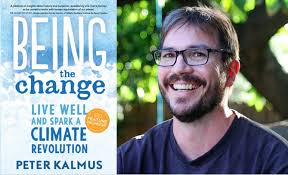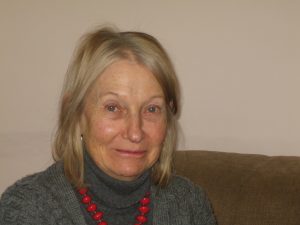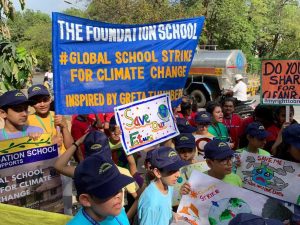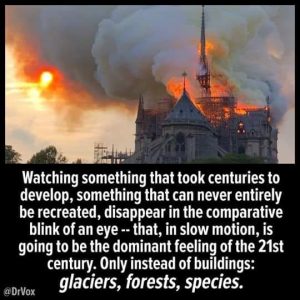NASA scientist Peter Kalmus explains how he slashed 90% of his personal emissions. Senior South American reporter Sue Branford warns the Amazon rainforest, the lungs of the planet, is not just dying. It is being murdered. Then we hear 16-year-old Greta Thunberg‘s speech to the European Parliament.
We live in times of faint hope amid darkening despair. Last week an ancient cathedral burned, a criminal politician got away with it, a climate lawyer super-glued herself to Shell headquarters. Last week we pumped millions of tons of global warming carbon into the air, more species staggered toward extinction, and a 16 year old girl tried to wake Europe and the world. I’m Alex Smith. This is Radio Ecoshock.
Listen to or download this Radio Ecoshock show in CD Quality (57 MB) or Lo-Fi (14 MB)
PETER KALMUS – PERSONAL ACTION IS POSSIBLE
We are destroying the life support systems our children and grandchildren will need. We don’t mean to, but we do. Something has to change, and author Peter Kalmus says it’s us. I need to be the change. You need to be the change we want.
Peter Kalmus is a hybrid. By day, he is a published climate scientist at NASA’s Jet Propulsion Lab in California. The rest of the time, Peter and his wife find ways to opt out of the death system. He was named as one of ten “Visionaries” in the 2018 Grist list (picked as favorite by Katherine Hayhoe. Peter wrote the book “Being the Change: Live Well and Spark a Climate Revolution“. It is stuffed with realistic stories and charts full of tips how to get off this climate-killing ride. The book has since been turned into a film, available on DVD.
From Pasadena California, we welcome Peter Kalmus to Radio Ecoshock. Of course, he is not speaking for NASA, but about his own views and experience.

Listen to or download this 29 minute interview with Peter Kalmus in CD Quality or Lo-Fi
Peter writes:
“I am a climate scientist at NASA’s Jet Propulsion Lab. I use satellite data and models to study the rapidly changing Earth, focusing on boundary layer clouds and ecological forecasting. I have a PhD in physics from Columbia University and a BA in physics from Harvard.
Because burning fossil fuel is what’s causing global warming, the central focus of my response is to avoid burning it! Today I emit under 2 tonnes of CO2 per year, one tenth of the U.S. average. In reducing my footprint, I have discovered this to be surprisingly satisfying and empowering.
I also work within my community to help neighbors, cities, schools, and churches use less fossil fuel. Meditating and growing food helps me stay centered and happy even in the face of dire climate projections. My award-winning book, Being the Change: Live Well and Spark a Climate Revolution gives real life solutions to move away from a consumerist lifestyle that isn’t even making us happy.”
Peter’s science CV is here. Peter also studies clouds and “tornadogenesis” (the origins of tornadoes). He has co-authored papers on things like gamma bursts, supernovae, and mass black hole binaries. But he left Astrophysics for climate change science.
A FEW OF MY NOTES FROM PETER’S BOOK “BEING THE CHANGE”
The recommendations in the opening come from a star-studded climate cast: James Hansen, Bill McKibben, Rob Hopkins, John Michael Greer and Richard Heinberg, Michael Mann and more. So here we have climate science, from a real atmospheric scientist with tips for slashing carbon in your home, backyard and lifestyle, with a helping of bicycles and bees.
Peter writes:
“…global warming is happening with a rapidity that leaves me speechless. The longer we take to change direction, the more suffering we’ll experience and the longer this suffering will last. And for what? A consumerist lifestyle that doesn’t even make us happy. We must do everything we can to change direction. And a big part of this is imagining, living, and telling the stories of what comes next.”
“The prevailing mindset in our industrial society is to search for a silver bullet solution, some brilliant techno-fix that allows us to avoid personal change (which is assumed to be undesirable). After decades of searching by the world’s brightest minds, however, it seems likely that there is no such silver bullet. Personal change will therefore likely be necessary.”
He made fundamental changes in his life because:
1. it’s enjoyable
2. it’s empowering
3. he wants to help others, not harm them
4. it leads to connections and gratitude
5. small actions lead to larger actions
6. it demonstrates a new story
7. it’s meaningful
Peter says he can change the world, but he can’t save it. True to his research roots, he sees his role a a molecule in a wave, not a hero in a storybook. “The way our society lives no feels ephemeral to me”.
MOST CLIMATE SCIENTISTS HAVE GRIEVED ABOUT GLOBAL WARMING…
He went through the process of grief, and now finds we need patience. Yes it’s an emergency, but the required changes need patience.
“I used to see the future as more, I now see it as less.”
“…nine out of ten of my colleagues in Earth science have also grieved to some extent— though you’d never know this unless you performed an anonymous survey (as I did).”
In Chapter 6, Peter writes about Mindset and the myth of progress. But isn’t the science he loves one of the primary fruits of progress? If we “go simple” do we have to give up science (especially the kind that requires huge server farms to compute things like climate models)? I find a tension between Peter being the change, and his role as an investigative scientist. I’m sure he does too.
WASTING WATER “BAD”; WASTING JET FUEL “GOOD”?
Peter has often publicly challenged other scientists to fly less, if at all. He’s also critical of environmental leaders that fly all over the world creating more greenhouse gases. To stop flying, he says, is the biggest step most of us can take to reduce our greenhouse gas emissions. As a climate radio host, I have not flown anywhere for 11 years, which is tough as a former globe trotter.
Why is wasting water in California bad, while wasting oil and jet fuel is good?
“… there’s a striking difference in the social dynamics of fossil fuel use and water use in Southern California. Wasting water isn’t socially acceptable. During a drought, people get very angry about it. On the other hand, burning fossil fuels is not only socially acceptable, it’s socially rewarded. Frequent fliers post trip photos on Facebook, enjoy career advantages, and are seen as successful. This difference might be partly because water is more immediate than global warming….Many are the avid environmentalists who shop at the farmers’ market with cloth bags, while still flying tens of thousands of miles per year.”
LEAVING FOSSIL FUEL
“…by making changes to my daily life, I’ve reduced my emissions by more than a factor of ten. I used to emit slightly more greenhouse gases than the average American. Now I emit less than the average human (see Figure 9.1). However, I still emit nearly twice the average Bangladeshi,1 and infinitely more than a wild, nonhuman Earthling.”
And yet he and his family continue to live “a normal suburban life”. In the interview, I ask him how they do it. His book has concrete steps.
“As I ramped down flying, I also reduced my emissions from food, waste, and driving. I became vegetarian, started growing food, and began obtaining much of my food from the waste stream (freeganism). I started composting aggressively, and biking became my primary
mode of transportation.”
WE SUFFER FROM THE DISEASE OF WANTING
“Whereas the immediate physical cause of global warming is our greenhouse gas emissions, the deepest underlying cause of the broader predicament is our wanting. Wanting drives both consumerism and overpopulation. We endlessly want more: more money, more sex, more prestige, a faster car, a bigger house, fancier furniture. And when we get something we want, the relief from our desire is fleeting. In a short time, we again want more. Wanting is a bottomless pit.”
“Not only is our wanting straining the biosphere to its breaking point, it’s causing us to suffer. When we want something, it’s because we’re not satisfied in the present moment. Indeed, the entire purpose of the advertising industry is to cause us to feel unsatisfied with what we have. When we want, we feel agitated, unable to appreciate the miracles right in front of us. This dissatisfaction is suffering, but we may be so habituated to it that we don’t recognize it.”
Peter Kalmus uses meditation to help him change this state of mind, and to calm himself from what he knows as a climate scientist. Of course, as a scientist, Kalmus investigated and describes in his book the benefits to the brain of doing meditation.
=============================================================================================================
SUE BRANFORD REPORTS ON THE MURDER OF THE AMAZON
In Brazil, their own Donald Trump – newly elected President Jair Bolsonaro – is whipping up land-grabbers in the Amazon rainforest, and encouraging violence. There have been three massacres of native Amazonians in the last few weeks, while environmental laws have been tossed out the window. Here is the latest.
3 massacres in 12 days: Rural violence escalates in Brazilian Amazon
Climate change threatens to destroy the vast Amazon rainforest of South America. But Brazilians may still do if first. Everything from biodiversity, human rights, to rainfall in Africa is at risk. Let’s go to one of the most experienced correspondents covering the Amazon.
Sue Branford became a journalist in Brazil, reporting for the Financial Times and the Economist. She was Latin America editor for the BBC for 15 years, and still returns to Brazil for the Times, the Guardian, and Mongabay. From London, Sue Branford talks with to Radio Ecoshock.

Sue Branford journalist.
Listen to or download this 19 minute interview with Sue Branford in CD Quality or Lo-Fi
The debate over land use is particularly fierce in Rondonia. The latest figures published by the government’s Brazilian Institute of Geography and Statistics (Instituto Brasileiro de Geografia e Estatística), show that, whereas 30 years ago only 2 percent of the state’s forested land had been felled, that has now increased to 28.5 percent, the highest level in any Amazonian state. The main reason: a massive influx of land-hungry families, encouraged by the government, along with the uncontrolled expansion of logging and land clearing for ranching.
Brazil scraps 11 new Amazon protected areas covering 2,316 square miles
I have been following the fate of the Amazon for a very long time. Here is a picture of my ticket to a ballet “A Floresta Amazonica” created for the 1992 United Nations Earth Summit. I saw it in Rio de Janeiro on June 5, 1992.

Was there more concern about the Amazon then than now, even though it continues to disappear? If and when the Amazon converts to grasslands or scrub, weather systems will change all over the world.
Sue Branford expresses it beautifully in our interview:
“I think the Amazon should be covered more because what happens in the Amazon is going to affect us all in the world. It’s an enormous forest. It covers 2 million square miles – the biggest forest in the world – contains a fifth of the world’s drinking water, and I think really the fate of the planet is going to be decided in the Amazon.”
=================================================================================================================
GRETA THUNBERG KEEPS TELLING US LIKE IT IS
Then I play fifteen-year-old climate activist and school striker Greta Thunberg, addressing the European Parliament on April 16, 2019. I’ve made slight improvements to the sound quality.
Listen to or download this 11 minute speech by Greta Thunberg to the EU Parliament in CD Quality or Lo-Fi

School Strike New Delhi, India
As the commentary to one You tube production of the speech says:
“Swedish teenage environmental activist Greta Thunberg says time is running out to halt climate change and she’s urging European politicians “to panic.”
Thunberg told Members of European Parliament today: “I want you to act as if the house is on fire.”
She said that “if our house was falling apart you wouldn’t hold three emergency Brexit summits and no emergency summit regarding the breakdown of the climate and environment.” In a reference to the international funding effort launched to rebuild the fire-ravaged Notre Dame cathedral in Paris, she urged the lawmakers to use “cathedral thinking” to tackle climate change.”
MY SMALL CONFESSION
Lately I am discouraged. After 13 years of helping to communicate climate danger directly from the world’s great scientists, we are still drifting toward the black hole of a super-heated world where most species perish. Climate programs are still a niche on the fringe. I’m chronically broke, chronically sore, and wonder why I carry on.
Of course, we are not alone. This story from ClimateHomeNews says a lot: Farhana Yamin, quote: “is a legal expert who has advised various developing countries in climate negotiations… On Tuesday, she told Climate Home News that the Paris Agreement, which she helped negotiate in 2015, was “not delivering”.
“I thought that was my story,” she said. “I thought that the law and science and speaking truth to power worked. That we would be able to act with kindness and in time and on the basis of the precautionary principle and all these lovely ideas that we enshrined in law in the early 80s and 90s.
“And we haven’t done that and that’s because these guys [Shell] knew and have stopped it. It’s not some random delay, this delay has been planned in the system, it’s been financed, it’s been lobbied for. So that’s why today, I feel totally comfortable and I wish I’d done it sooner, had woken up to the power dynamics and not been so naive.”
That is also how I feel about the failure of American Democracy to defend itself against a takeover by big money and foreign governments. I thought there might still be some justice left. Now I feel naive, again.
But remember, while mainstream media carries us on through each country’s passion play of politics and corruption, we humans fill the skies with millions of fuel-laden airplanes, we operate billions of oil and gas engines. We suck up the wild spaces and fill every living belly with plastic.
That is the real cathedral burning down daily, the cathedral of life.
Let our prayers for salvation be our actions, large and small.

I’m Alex Smith. Please help support my on-going work with your donation, large or small. Thank you for being brave enough to keep listening to Radio Ecoshock.
We go out with a bit from Eliza Gilkyson’s fine song, “The Great Correction”. It fits so well.
“People ’round here don’t know what it means to suffer at the hands or our American dream
turn their backs on the grisly scene, chasing frivolous stunts
They got their God, they got their guns, got their armies and the Chosen Ones,
But we’ll all be burnin’ in the same big sun, when the Great Correction comes.”
two small typos, real small; “society lives no feels” should no be now? and “hands or our American”, should or be of?
A powerful program again this week; three articulate authorities put the pedal to the metal!
Will you ever know how many lives and decisions you have touched these 13 years? No, you have to labour on in the trust that you are bending the curve in the right direction. Like K Hayhoe said, her biggest climate impact is not cutting her own emissions or serving as a model for others on this front. It’s simply talking to as many people as possible about the perils of climate change.
We all, can do more, including poking into the lives of the rich and powerful, opinion leaders and the comfortable, and afflict them with knowledge they cannot deny, emotions they cannot hide from, and choices they must make.
I feel for your sense of frustration and hopelessness. You do incredible work and are one of the few who understand the dire nature of our current state. Please keep up the valiant fight – its good work in this time of collapse
Sorry, Alex. We’re on the side of Malthus, Paul Ehrlich and lots of others who didn’t turn away when they saw the unflattering proclivities of Homo sapiens. No one wants to face it, least of all those who who gained social status and wealth by reinforcing the lies that are the foundation of our civilization. Milton had it right–they’d rather rule in the hell of ecological decline than serve in the heaven of admitting we are a part of nature and not apart of it.